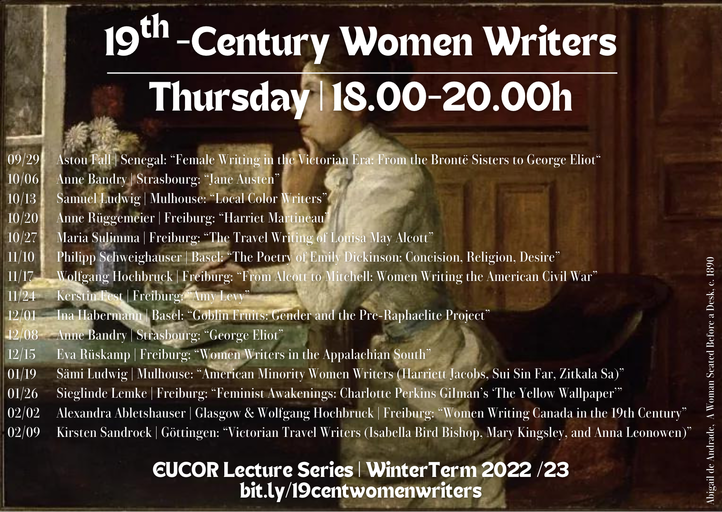Ringvorlesungen & Kolloquien | Lecture Series & Colloquia
LitCult Colloquium

Ringvorlesung Theater in der Schule - Theatre in Education

Cultural Memory | EUCOR Lecture Series
Wednesdays, 4.15 pm | HS 1098
The third installement of the EUCOR lecture series, in collaboration with the Carl-Schurz-Haus, will have contributions from all four EUCOR universities as well as external guests. It will take place on Wednesdays, 4.15-5.45 pm in HS 1098.
P R O G R A M
April 17 & 24 | Introduction & Organization by Ece Ergin & Kristina Seefeldt (University of Freiburg)
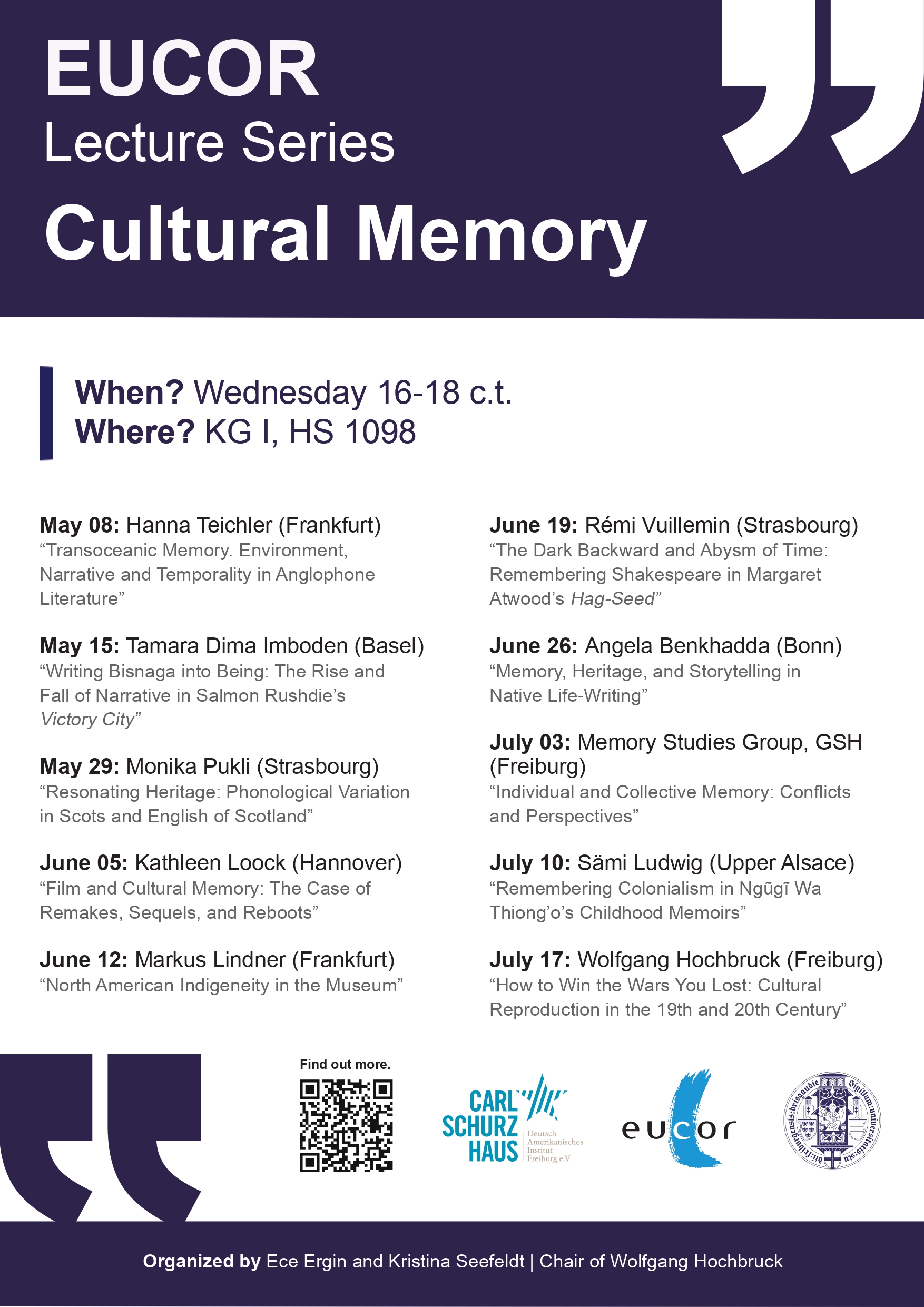
A B S T R A C T S
May 8 | Hanna Teichler (Frankfurt)
“Transoceanic Memory. Environment, Narrative and Temporality in Anglophone Literature”
This lecture introduces two formative scholarly and discursive paradigms of the 20th and 21st century: memory and the Anthropocene. The environmental turn in the humanities is emblematic of our times, as climate crises and all-pervasive environmental decline are long-term developments that increasingly attract short-term attention. By the same token, the 20th century has seen a ‘boom’ in exploring how and what collectives remember. Recently, more and more scholarship emerges that investigates the connection between memory and the environment, remembering and ecocriticism, and between memory cultures and the Anthropocene.
The notion that oceanic spaces frame identity and belonging has been established already, especially in the context of postcolonial studies, but these spaces have not been used as a framework to theorize an approach to memory. In this lecture, taking cue from literary examples from the Anglophone sphere, I conceptualize transoceanic memory (studies) as an approach to both memory and environment; as mode, method and material of remembering. Transoceanic memory emerges when we leave behind land-based configurations of history and identity, and trace how memory creates and reveals geomnemonic spaces, which offer alterative frameworks to established geopolitical formations such as Global North/South.
Transoceanic memory fictions as my primary material of study make use of environmental formations in the text to make a point about such spatiotemporal dynamics in processes of remembering. These formations can exert influence on the textual composition, as they often contribute to framing plot and narrative. Through an analysis of a select body of Anglophone novels, I show how transoceanic memory is encoded in environmental textual forms; in water bodies, archipelagic and littoral structures, in monsoon winds or migrant species, as they feature in the fictional texts. These environmental structures are deployed by the texts to further problematize notions of national belonging, both with regard to nation as identity template and physical space, and to highlight the unpredictable, often unbound nature of identity formation.
May 15 | Tamara Dima Imboden (Basel)
“Writing Bisnaga into Being: The Rise and Fall of Narrative in Salmon Rushdie’s Victory City”
When, in Salman Rushdie’s recent novel Victory City, the goddess-sorceress Pampa Kampana enchants a bag of seeds to sprout the city of Bisnaga, her appointed kings Hukka and Bukka Sangama are quick to notice that their city is populated by “sleepwalkers” and “empty people” (23). Pampa notes that, being born from seeds, these people have no histories, so she “mak[es] up their lives” by “sending the stories whispering through the streets into the ears that needed to hear them, writing the grand narrative of the city” (31). Her narrative is what constructs the people’s sense of identity, sense of continuity and, in other words, their cultural memory. As the novel’s blurb points out, however, “stories have a way of getting away from their creator”: 200 years following Pampa’s great act of invention, the people no longer see their goddess as the source of their history. As they fully believe the stories they have been given, these stories gain a life of their own. The fabric of Bisnaga’s cultural memory changes, as does its relationship to the founding narrative. This lecture will explore Victory City’s portrayal of narrative and cultural memory in two parts. The first part will consider the role of narrative in the construction of the cultural memory of Bisnaga. The second section will explore the tension between individual and cultural memory as the narrative of Bisnaga begins to fail. Drawing in part on Astrid Erll and Ann Rigney’s theorizations on cultural memory, and, in particular, on Ann Rigney’s explorations of the role of narrative in the mediation of collective and cultural memory, this lecture explores our understanding of narrative as formative of cultural memory through the lens of Victory City.
May 29 | Monika Pukli (Strasbourg)
“Resonating Heritage: Phonological Variation in Scots and English of Scotland”
This lecture aims to explore the connection between language and cultural memory, specifically focusing on phonological variation within Scots and English spoken in Scotland. Grounded in linguistic analysis, the session will investigate how the unique phonological features of these languages function as linguistic repositories, encapsulating historical, social, and regional markers that contribute to shaping Scotland's cultural memory today. Languages, as carriers of cultural heritage, undergo dynamic evolution, reflecting societal shifts and historical events. In this lecture, we will concentrate on selected phonological aspects of Scots and English spoken in Scotland to illustrate how these linguistic features capture and perpetuate the region's unique linguistic diversity, cultural experiences, and identity. Firstly, a brief analysis of intonation variations in Scots and English across different regions of Scotland will highlight how intonation can serve as a marker of cultural identity. This will be complemented by a short exploration of how outsiders perceive the accents of Scotland. Secondly, the lecture will examine how speakers adeptly shift linguistic styles or code-switch between Scots and English, exploring how these phenomena contribute to the dynamic representation of cultural memory. Lastly, an in-depth analysis of current research on epenthesis (the insertion of a sound within a word) in lexical items such as "film" and "world" will provide insight into how subtle linguistic nuances reflect ancient linguistic influences. In summary, students will gain insights into how language analysis connects with cultural heritage and history, offering a practical view of how language serves as a reflection of cultural memory in the context of Scotland.
Short Bibliography
- Maguire, Warren. 2017. “Epenthesis in liquid+consonant clusters in Scots.” In Cruickshank, Janet and Robert McColl Millar (Eds.) 2017. Before the Storm: Papers from the Forum for Research on the Languages of Scotland and Ulster triennial meeting, Ayr 2015. 156-83. Aberdeen: Forum for Research on the Languages of Scotland and Ireland
- McClure, J. Derrick. 1997. Why Scots Matters. 2nd edition. Edinburgh: Saltire Society
- Millar, Robert M. 2023. A history of the Scots language. Oxford: Oxford University Press
- Millar, Robert M. 2020. A sociolinguistic history of Scotland. Edinburgh: Edinburgh University Press
- Stuart-Smith, Jane. 2003. “The Phonology of Modern Urban Scots.” In John Corbett, J. Derrick McClure & Jane Stuart-Smith (Eds.) The Edinburgh Companion to Scots. 110-137. Edinburgh: Edinburgh University Press
June 5 | Kathleen Loock (Hannover)
“Film and Cultural Memory: The Case of Remakes, Sequels, and Reboots”
A wide array of media – including Hollywood movies – actively generate memories that link individuals to a collectively shared past. They can affect how we remember the past and understand our own life story within the larger historical structures of a culture. Building on the concept of cultural memory and theoretical approaches to memory and media, this lecture focuses on Hollywood remaking, a longstanding industry practice that generates film remakes, sequels, and reboots through serial patterns of repetition and innovation. Popular culture brims with stories that have been retold so often that their fictional characters and storyworlds form stable elements of a culture and of everyday life. I argue that Hollywood remaking produces media objects that are unique vessels of memories and meanings. Film remakes, sequels, and long-running franchises, that is, function as “sites of memory” (Pierre Nora) that establish a distinctive temporal relationship between movies and viewers, always conjuring up the past, as they mediate memories on the diegetic level but also in a more abstract sense, where they invoke the real world and lived experiences outside the movies. I will discuss how remaking intersects with concepts of memory, time, and critically examine how the movies like Stella Dallas, gender-swap reboots, or sequels like Jumanji: Welcome to the Jungle and Ghostbusters: Afterlife negotiate past and present, stability and change, as well as nostalgia and its political implications.
June 12 | Markus Lindner (Frankfurt)
“North American Indigeneity in the Museum”
Against the background of current legislation in the USA, which requires museums to obtain the consent of the respective tribal authorities before exhibiting objects, the lecture reflects on the representation of US Native Americans from a historical perspective and with contemporary examples from the US and Germany. It will discuss how and why the collaboration between museums and indigenous peoples has changed and what challenges and problems can arise. A central question will be who had an indigenous voice in museums until 2023 and how this could change in the future. With the new regulations, technocratic rules seem to be replacing the long process of trust-building on which the partnership between museums and cooperation partners has been built up to now.
June 19 | Rémi Vuillemin (Strasbourg)
“The Dark Backward and Abysm of Time: Remembering Shakespeare in Margaret Atwood’s Hag-Seed”
Margaret Atwood’s Hag-Seed (2016) is part of a wider project established by the revived Hogarth press. A commemoration both of Shakespeare and of the original Hogarth press founded by Virginia and Leonard Woolf, the Hogarth Shakespeare aimed at offering rewritings of some of Shakespeare’s most famous plays by distinguished and successful contemporary writers. As such, this collection was one of many instances of remembering and toying with collective memories of Shakespeare. This fact seems to have been easily grasped by Margaret Atwood, whose retelling of The Tempest—itself a play with a complex relationship to problematic aspects of world history—is endowed with a strong reflexive dimension, though it is itself caught between memory and oblivion. While Atwood seems to leave aside certain postcolonial interpretations of The Tempest to engage in a rewriting that is essentially playful and deferential to Shakespeare, she activates other memories that are more closely connected to her early career and claims about Canadian identity in the 1950s, 60s and 70s. In that sense, the novel ends up being about Canada and its complex relationship to a major author of the Imperial canon. While not exactly using Shakespeare uncritically, Atwood ultimately seems to be trying to show how the works of the dramatist can be used as tools of mediation to promote a form of reconciliation.
June 26 | Angela Benkhadda (Bonn)
“Memory, Heritage, and Storytelling in Native Life-Writing”
In the preface to his poetry collection From Sand Creek, Simon Ortiz asks his readers “how to deal with history.” This question points to the exclusion of Native American cultural memory and heritage from dominant historical discourses, within which “Indians didn’t matter” (ibid.). As Native American historians and intellectuals like Jean M. O’Brien have shown, U.S.-American historiography has systematically written Indigenous peoples out of history through the narratives of “firsting” and “lasting,” simultaneously assigning primacy to European settlers and insisting on the inevitability of the extinction of Native Americans to make way for progress (cf. O’Brien xv). At the same time, settler-colonial archaeology and anthropology engaged in the collection and preservation of human remains and artifacts belonging to peoples they deemed to be “vanishing.”
However, contesting these narratives as well as the misrepresentation and appropriation of Native American bodies and cultural items in museums, tribal museum curators, Native scholars, and writers have asserted what scholar Scott Lyons calls “rhetorical sovereignty” by representing their heritage through the lenses of Indigenous conceptions of cultural memory. Life-writing, in particular, has become a popular generic form for the exploration of the intersections of oral traditions, the history of U.S.-American settler-colonialism, and personal memory “[presenting] careful investigations of territoriality as a category of selfhood (Sarkowsky 104). In my talk, I want to discuss the negotiation of memory and heritage through forms of personal storytelling in Pulitzer-prize winner N. Scott Momaday’s (Kiowa) The Way to Rainy Mountain (1969), Bad Indians (2012) written by Deborah Miranda (Ohlone), and Choctaw-writer LeAnne Howe’s Choctalking on Other Realities (2013). In this way, my presentation will create a dialogue between theories of cultural memory and heritage and Native literary expression to explore three distinct but interrelated approaches to cultural memory – Momaday’s notion of “blood memory” (cf. Allen 93), Miranda’s depiction of intergenerational trauma, and Howe’s concept of “tribalography” (cf. Howe 118).
Works Cited
- Allen, Chadwick. "Blood (and) memory." American Literature, vol. 71, no. 1, 1999, pp. 93-116.
- Apaydin, Veysel, editor. Shared Knowledge, Shared Power: Engaging Local and Indigenous Heritage. Springer, 2018.
- Graham, Brian, Ashworth, Greg, and Tunbridge, John. A Geography of Heritage: Power, Culture and Economy. Arnold P, 2000.
- Hodgkin, Katharine and Radstone, Susannah, editors. 2003. Contested Pasts: The Politics of Memory. Routledge, 2003.
- Howe, LeAnne. “Tribalography: The Power of Native Stories.” Journal of Dramatic Theory and Criticism, 1999, pp. 117–26.
- Lyons, Scott Richard. “Rhetorical sovereignty: What do American Indians want from writing?” College Composition and Communication, 2000, pp. 447-68.
- McNiven, Ian and Russell, Lynette, editors. Appropriated Pasts: Indigenous Peoples and the Colonial Culture of Archaeology. AltaMira, 2005.
- O’Brien, Jean M. Firsting and Lasting: Writing Indians out of Existence in New England. U of Minnesota P, 2010.
- Ortiz, Simon. From Sand Creek. U of Arizona P, 1981.
- Ricoeur, Paul. Memory, History, Forgetting. Chicago: University of Chicago Press, 2004.
- Sarkowsky, Katja. “Cartographies of the Self: Indigenous Territoriality and Literary Sovereignty in Contemporary Native American Life Writing.” Journal of Transnational American Studies, vol. 11, no. 1, 2020, pp. 103–25.
July 3 | Memory Studies Group, GSH (Freiburg)
“Individual and Collective Memory: Conflicts and Perspectives”
Memory Studies is a vast field which influences different disciplines such as cultural studies, medieval studies, and classics. Whether memory construction happens in organized processes or is loosely embedded in cultural systems, whether it encourages a new approach to remembrance or supports a hegemonial structure, it is a universal phenomenon. The difference between individual and collective memory is especially intriguing, as the remembering of certain people or communities can change according to their position in a system and their role in the act of memory making. In this session, the working group will address narratives of war, grief, and crisis. Through insights into the speakers’ dissertation projects, the wide range of cultural memory studies is emphasized and the interdisciplinary approaches to it are highlighted. Additionally, the tension between individual and collective remembrance is explored further.
July 10 | Sämi Ludwig (Upper Alsace)
“Remembering Colonialism in Ngũgĩ Wa Thiong’o’s Childhood Memoirs”
I will use this occasion to shed light on the legacy of postcolonialism by reading two memoirs by Ngugi wa Thiong’o, the globally know Kenyan writer now living in Irvine, USA. A brilliant novelist and a powerful critic and essayist, Ngugi is also a man who writes wonderful texts about his own childhood and youth in colonial times. In DREAMS IN A TIME OF WAR, we learn about his ancestors and his childhood during colonialism. IN THE HOUSE OF THE INTERPRETER is about his time at an English boarding school. Both books are coming-of-age narratives that at the same time reflect on the colonial politics of the period and give us genuine insights into the social, political, educational experiences and even the military conflicts of the time. I will prepare some reading materials for the students.
July 17 | Prof. Dr. Wolfgang Hochbruck (Freiburg)
“How to Win the Wars You Lost: Cultural Reproduction in the 19th and 20th Century”
tba
Archive
Language & Communication | Lecture Series
Thursdays, 4.15 p.m. | via Zoom
The new lecture series "Language & Communication" organized by the Department of General Linguistics took place every Thursday at 4.15 p.m. during the summer semester 2021. A program of the lecture series can be found here.
Login details for all lectures in the series:
In the winter semester 2022/23, as part of the EUCOR/The European Campus program, members of the English Departments of the Universities Basel, Mulhouse, Strasbourg, and Freiburg are contributing to the joint online lecture series “Nineteenth-Century Women Writers” hosted by UHA Mulhouse and organized by Prof. Dr. Sämi Ludwig.
From our Department, the following people will give talks:
- 20 Oct. 2022 – Anne Rüggemeier: “Harriet Martineau”
- 27 Oct. 2022 – Maria Sulimma: “The Travel Writing of Louisa May Alcott”
- 17 Nov. 2022 – Wolfgang Hochbruck: “From Alcott to Mitchell: Women Writing the American Civil War”
- 24 Nov. 2022 – Kerstin Fest: “Amy Levy”
- 15 Dec. 2022 – Eva Rüskamp: “Women Writers in the Appalachian South”
- 26 Jan. 2023 – Sieglinde Lemke: “Feminist Awakenings: Charlotte Perkins GiIman’s‘The Yellow Wallpaper’”
- 09 Feb. 2023 – Kirsten Sandrock: “Victorian Travel Writers (Isabella Bird Bishop, Mary Kingsley, and Anna Leonowen)”
The lectures can be watched online.
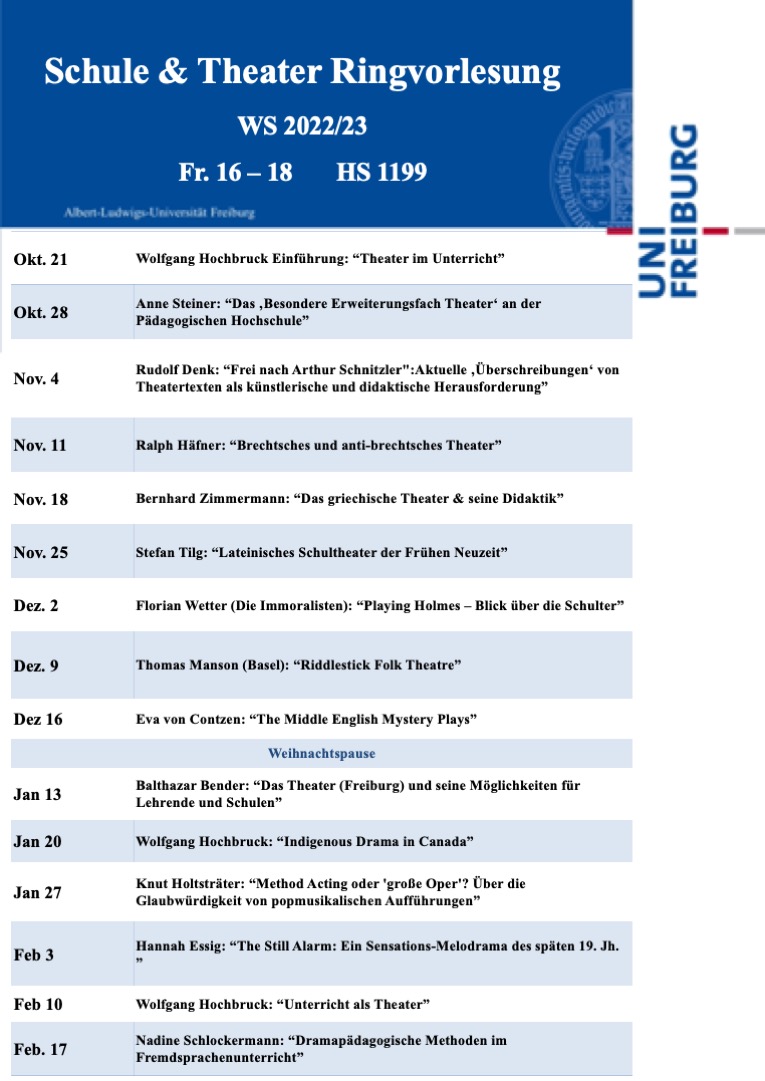
Kontakt: Tenure Track-Prof. Dr. Eva von Contzen
Von der Uni in den Beruf | Vortragsreihe
Thursdays, 6.15 - 7.45 p.m. | HS 1016
- October 20: Psychologie im Bewerbungsgespräch (Christian A. Bernhardt)
- November 17: Karriereoption Start-up: Mit der eigenen Idee aus der Wissenschaft heraus Märkte erobern (Dr. Thomas Maier)
- November 24: Das Kompetenzprofil in der Bewerbung: Präsentieren Sie Ihre Qualifikationen (Karin Peterseil)
- December 1: Wege in den verdeckten Arbeitsmarkt - Life/Work Planning (Marc Buddensieg)
- February 9: Berufseinstieg für Geisteswissenschaftler: Tipps für Dein erfolgreiches Praktikum (Hannah Nesswetter und Christof Hilligardt)
More information here.
Alles im Blick? | Inderdisziplinäre Vortragsreihe Nachhaltigkeit
Wednesdays, 6 - 7.30 p.m. | HS 1221
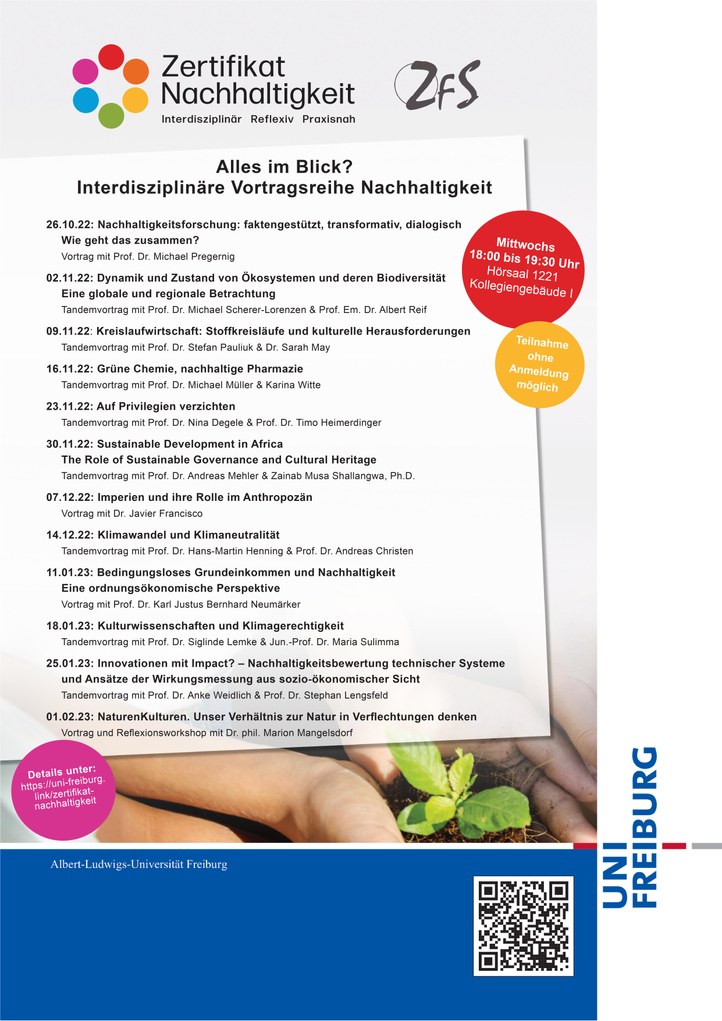
Participation is possible in person or via live stream: all lectures will also be broadcasted via live stream. You can find the link to each live stream and further information on the website of the Zentrum für Schlüsselqualifikationen (Center for Key Qualifications).
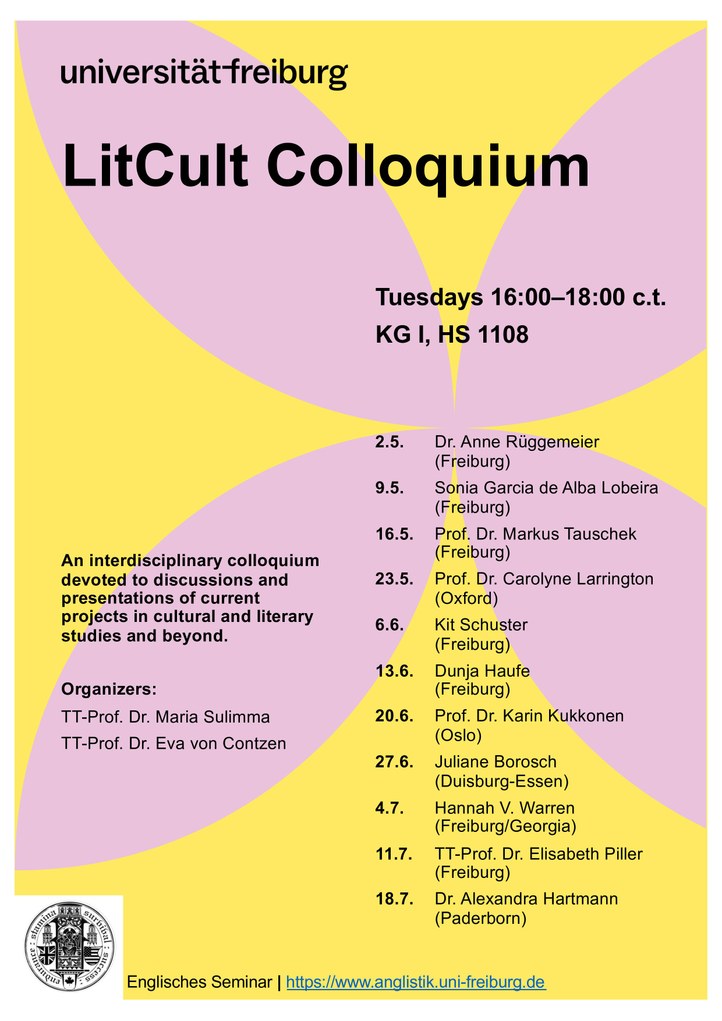
This colloquium provides a venue for current research projects in literary studies and cultural studies (including media studies, American studies, Anglophone studies, medieval and early modern studies) at the English Department. We feature a number of guest speakers from other departments of the University of Freiburg as well as external guests from other universities both national and international.
The colloquium is open to all interested.
P R O G R A M
| 25.04. |
Academic Writing / Open Session for PhD students |
|
| 02.05. |
Robert Burton's Anatomy of Melancholy (1621) and the Relationality of the Writing Scene: towards a praxeological approach to the myth of the 'lonely writer' | Dr. Anne Rüggemeier (Freiburg) |
| 09.05. |
Emotions in Middle English Romances: Queens, Kings, and the Accusers in Between |
Sonia Garcia de Alba Lobeira, M.A. (Freiburg) |
| 16.05. |
Competition as Unavoidable Mode of Action? Cultural Perspectives on the Meaning of Competitive Practices in Real Life | Prof. Dr. Markus Tauschek (Freiburg) |
| 23.05. |
'To Hide Him Self He Began to Smile at Them’: Seeking the Medieval Self in Middle English Literature ! 6-8pm | HS 1009 ! Part of the workshop Medieval Identities: (Re-)Constructing the Self and the Other, which takes place on that day at FRIAS, starting at 9am |
Prof. Dr. Carolyne Larrington (Oxford) |
| 30.05. |
No session / Pentecost Break |
|
| 06.06. |
Trans Future Fictions |
Kit Schuster, M.A. (Freiburg) |
| 13.06. |
Shapeshifters in Medieval Romances |
Dunja Haufe, M.A. (Freiburg) |
| 20.06. |
Where Does Form Come From? Four Attempts on Creativity in Literary Writing |
Prof. Dr. Karin Kukkonen (Oslo) |
| 27.06. |
Landmarks, Landscapes, Infrastructure – the Use of Creative Vehicles for Sustainable Renewal in (Post)Industrial Cities | Juliane Borosch (Duisburg-Essen) |
| 04.07. |
Monstrous Aesthetics: A Creative and Critical Exploration |
Hannah V. Warren (University of Georgia) |
| 11.07. |
Around the World in Eighty-Two Days – Herbert Hoover’s 1946 Famine Survey and the Making of the American Century | TT-Prof. Dr. Elisabeth Piller (Freiburg) |
| 18.07. |
Class Encounters in US American Reform Culture: Relationality, Intimacy, and the Sentimental | Dr. Alexandra Hartmann (Paderborn) |
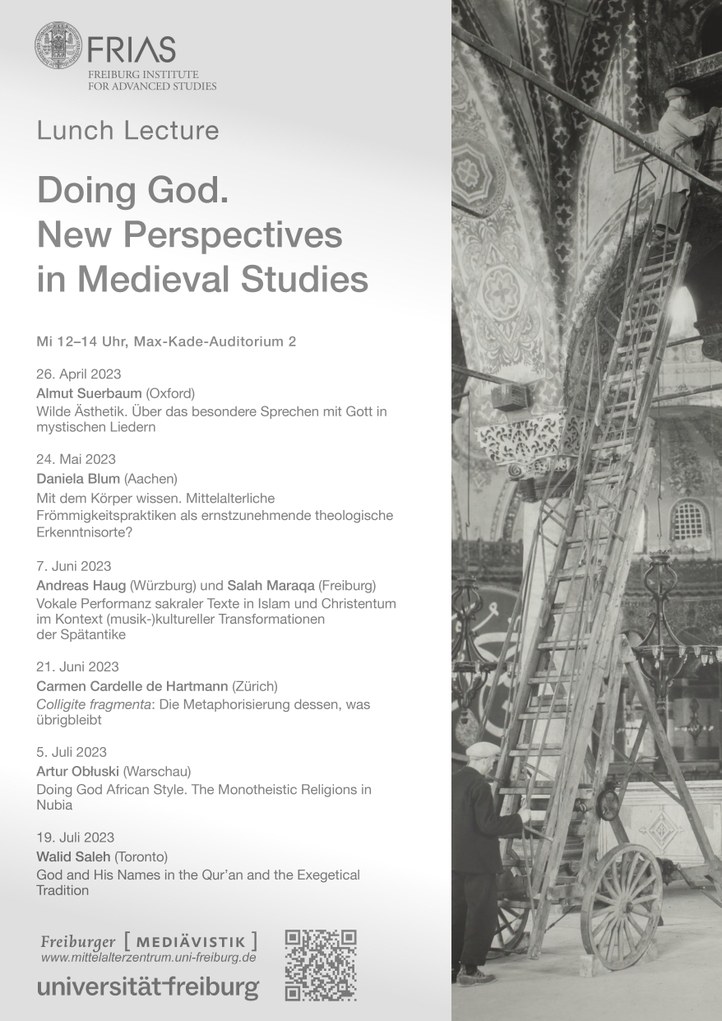
Diploma in Foreign Policy and Security Studies
Die Center For American & European Studies Foundation lädt zur Teilnahme an ihrem Diplomprogramm im Bereich Außenpolitik und Sicherheitswissenschaften mit Experten aus den Vereinigten Staaten ein. Das Programm Diploma in Foreign Policy and Security Studies besteht aus fünf 90-minütigen Kursen unter Beteiligung amerikanischer Experten auf dem Gebiet der Sicherheits- und Außenpolitik, zusammengefasst durch eine internationale wissenschaftliche Konferenz.
- 28.03. 2023, 18.30 - 20.00 Uhr: The war in ukraine: putin's miscalculations, international implications, and U.S. Response (Jaro Bilocerkowycz – University of Dayton, Ohio)
- 26.04.2023, 18:30 - 20:00 Uhr: Nato engagement in the war in ukraine (Charles Kupchan – Georgetown University)
- 24.05.2023, 18:30 - 20:00 Uhr: American and nato foreign policy in eastern europe, with special emphasis on ukraine and russia (Collin Anderson – University at Buffalo New York)
- 14.06.2023, 18:30 - 20:00 Uhr: How the U.S. And the eu's failure to create a sustainable anti-corruption civil society sector in eastern europe led to the rebirth of populism and russophilia in the region (Svet Derderyan – University of Colorado Boulder)
- 26.07.2023, 18:30 - 20:00 Uhr: Ukrainian democracy & russias war against ukraine (Sarah Wilson Sokhey – University of Colorado Boulder)
- 18.08.2023, 16:30 - 21:00 Uhr: International conference on foreign policy & security studies
Weitere Informationen zum Programm finden Sie auf der Website der CFAS. Bei Fragen können Sie gerne die folgende Mail-Adresse kontaktieren: wajgielt@cfasofficial.org.
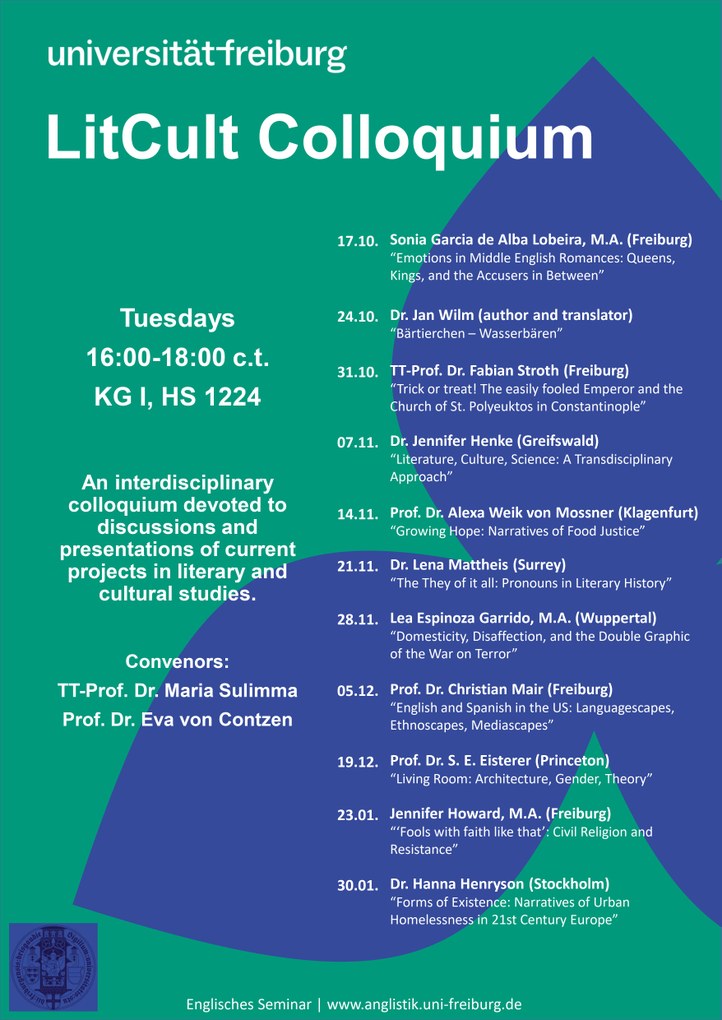
This colloquium provides a venue for current research projects in literary studies and cultural studies (including media studies, American studies, Anglophone studies, medieval and early modern studies) at the English Department. We feature a number of guest speakers from other departments of the University of Freiburg as well as external guests from other universities both national and international.
The colloquium is open to all interested.
P R O G R A M
|
17.10. |
Emotions in Middle English Romances: Queens, Kings, and the Accusers in Between | Sonia Garcia de Alba Lobeira, M.A. (Freiburg) |
| 24.10. | Bärtierchen – Wasserbären |
Dr. Jan Wilm (author and translator) |
| 31.10. | Trick or treat! The easily fooled Emperor and the Church of St. Polyeuktos in Constantinople |
TT-Prof. Dr. Fabian Stroth (Freiburg) |
| 07.11. | Literature, Culture, Science: A Transdisciplinary Approach |
Dr. Jennifer Henke (Greifswald) |
| 14.11. | Growing Hope: Narratives of Food Justice |
Prof. Dr. Alexa Weik von Mossner (Klagenfurt / Freiburg) |
| 21.11. |
The They of it all: Pronouns in Literary History |
Dr. Lena Mattheis (Surrey) |
| 28.11. |
Domesticity, Disaffection, and the Double Graphic of the War on Terror | Lea Espinoza Garrido (Wuppertal) |
| 05.12. |
English and Spanish in the US: Languagescapes, Ethnoscapes, Mediascapes |
Prof. Dr. Christian Mair (Freiburg) |
| 12.12. |
Academic Writing / Open Session for PhD students |
|
| 19.12. |
Living Room: Architecture, Gender, Theory |
Prof. Dr. S. E. Eisterer (Princeton) |
| 09.01. |
No session |
|
| 16.01. |
No session |
|
| 23.01. |
’Fools with faith like that’: Civil Religion and Resistance |
Jennifer Howard (Freiburg) |
| 30.01. | Forms of Existence: Narratives of Urban Homelessness in 21st Century Europe | Dr. Hanna Henryson (Stockholm) |
| 06.02. |
Academic Writing / Open Session for PhD Students |
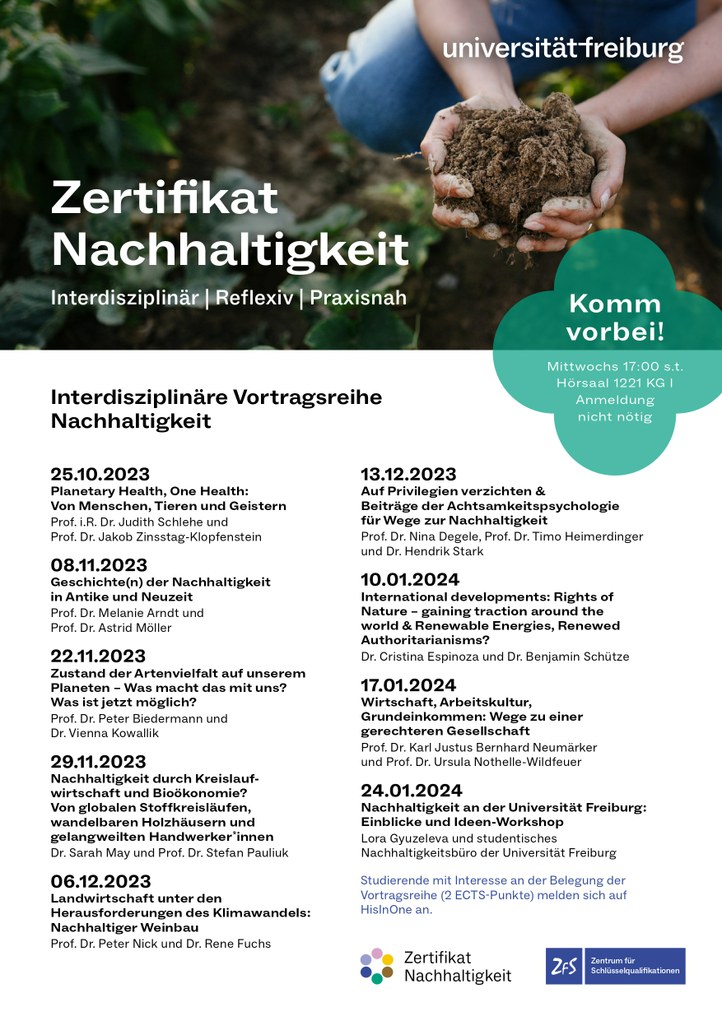 Find more information here!
Find more information here!


